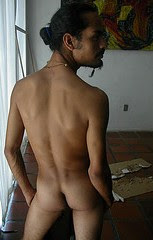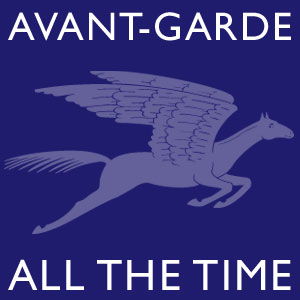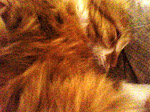
Ferreira Gullar
Um instante........... A moment
Aqui me tenho........... Here I got me
Como não me conheço ...........As I do not know me
Aqui me tenho........... Here I got me
Como não me conheço ...........As I do not know me
nem me quis.......... or want to
sem começo ...........without beginig
sem começo ...........without beginig
nem fim........... or end
aqui me tenho........... here I have me
sem mim ...........without me
nada lembro........... I remember anything
nem sei ...........I know nothing
à luz presente ...........to the present light
sou apenas um bicho........... I am only a insect
transparente ...................transparent

aqui me tenho........... here I have me
sem mim ...........without me
nada lembro........... I remember anything
nem sei ...........I know nothing
à luz presente ...........to the present light
sou apenas um bicho........... I am only a insect
transparente ...................transparent

Ferreira Gullar is the pen name for José Ribamar Ferreira
(born in São Luís, Maranhão, Brazil on September 10, 1930),
Brazilian poet, playwright, essayist, art critic, and television writer.
In 1959 he formed the "Neo-Concretes" group of poets.
The Neo-Concrete Manifesto of that year by him begins:
We use the term "neo-concrete" to differentiate ourselves from those committed
We use the term "neo-concrete" to differentiate ourselves from those committed
to non-figurative "geometric" art (neo-plasticism, constructivism, suprematism,
the school of Ulm) and particularly the kind of concrete art that is influenced
by a dangerously acute rationalism. In the light of their artistic experience,
the painters, sculptors, engravers and writers participating
in this first Neo-concrete Exhibition came to the conclusion that it was necessary
to evaluate the theoretical principles on which concrete art has been founded,
none of which offers a rationale for the expressive potential they feel their art contains."
Living in Chile, in 1975, Ferreira Gullar wrote his best known work,
Living in Chile, in 1975, Ferreira Gullar wrote his best known work,
"Poema Sujo" ("Dirty Poem" in English). He was exiled by the Brazilian
dictatorial government that lasted from 1964 to 1985. The poem tells that the persecution to the exiled people was growing, many ones were being found dead
and, thinking in the hypothesis of his death, decided to write his last poem.
He passed months writing this poem with more than two thousand verses,
that brings forth his memories of his infancy and adolescence in São Luís,
Maranhão and the anguishes of being far from his land. Ferreira Gullar
read the poem at Augusto Boal's house in Buenos Aires, in a meeting organized
by Vinicius de Moraes. The reading, recorded on tape, became well known
between Brazilian intellectuals, who try to guarantee Gullar's return to
Brazil Brazil in 1977, where he continued writing to journals and publishing books.









































